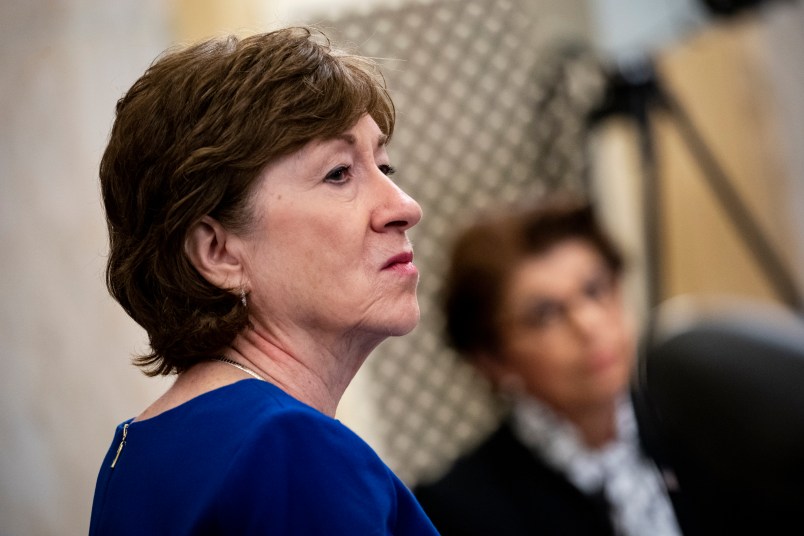This article is part of TPM Cafe, TPM’s home for opinion and news analysis.
During the nomination fight, Sen. Susan Collins (R) bought into now-Justice Brett Kavanaugh’s Roe v. Wade hedging, publicly asserting she believed Kavanaugh when he said he respected precedent.
But in dissenting with the decision issued on Monday regarding a Louisiana law restricting access to abortion, Kavanaugh stood against the four-year-old precedent the court established on a similar case in Texas.
The usually aggressive Collins press operation didn’t issue a statement until late in the day Monday. And what was released merely attempted to spit-shine Kavanaugh’s role in the ruling. Collins said that she agreed with the ruling and contended that it didn’t portend anything for “whether abortion would remain legal.” Kavanaugh, Collins said, “gave no indication in his dissenting opinion that he supports overturning Roe.”
In reality, Kavanaugh’s dissent fit squarely with a possibility many abortion advocates feared — that states would be allowed to pass more and more restrictions and these would ultimately limit access to abortion.
Maine’s other senator, independent Angus King, had raised just that scenario when he voted against Kavanaugh in 2018, stating, “he may not vote directly to repeal Roe — though I think his record indicates that he will — but he will almost certainly vote to whittle away its protections, leaving not much more than a hollow shell.”
Collins’ purported centrist credentials have relied in part on her stance as an advocate of reproductive rights, and that sort of positioning works well in Maine. But, with her vote for Kavanaugh, Collins lost the endorsements of the political arms of two abortion rights groups, NARAL and Planned Parenthood.
Those weren’t the only endorsements Collins has lost in recent years. The League of Conservation Voters isn’t endorsing Collins’ reelection. And King, who endorsed Collins in 2014, said on June 17 he “would probably stay out of the election this year,” adding, “I think the people of Maine can figure out how to vote without my guidance.”
When it comes to those pro-choice and environmental groups, Collins’ losses have been Sara Gideon’s gain. Gideon, who is the speaker of the Maine House, is the financial and polling front-runner in the Democratic primary race which, due to the pandemic, was postponed until July 14.
Gideon is certainly being treated as the nominee by the Collins campaign and the National Republican Senatorial Committee, as both lob near constant attacks at her. Collins’ campaign ads have also praised the senator’s involvement with the Paycheck Protection Program for helping many Maine small businesses.
Kavanaugh’s dissent adds another powerful theme to the campaign against Collins in a state whose political landscape has changed numerous times over her career. Two years ago Democrats won a trifecta in state government — recapturing the governorship and the state Senate and retaining the state House — and the second congressional district flipped from red to blue. And this year Democrats took a substantial lead in party registrations, reversing a more than three decades long pattern of most Maine voters affiliating with no political party.
With Collins’ long career, careful constituent service and previous history of attracting large majorities of the vote, the prospect of Gideon beating her is by no means a certainty.
But the four-term senator has put herself in an ever difficult position in recent months.
After the impeachment trial, Collins argued Trump learned a lesson from the proceedings, but Trump dismissed that contention. As John Bolton told Martha Raddatz, since Trump was “acquitted in the Senate … he didn’t learn lessons from it, other than that he could get away with it.”
Asked about Trump’s pandemic response in early April, Collins made some criticisms, but ultimately said Trump “did a lot that was right in the beginning.” The Trump administration’s numerous pandemic failures, coupled with the now 125,000-plus American deaths as new outbreaks flare, makes Collins’ statement lack plausibility.
And with this ruling on abortion rights, Collins elides the reality that, contrary to what she said in explaining why she backed Kavanaugh, he didn’t follow precedent and did endorse limiting abortion access.
By appearing too close to Trump and conservatives, while also not embracing Trump as closely as some Republicans would like, Collins runs the risk of losing voters from multiple parts of the political spectrum.
If incorporated into a broader, sustained campaign narrative, this abortion ruling could undermine Collins’ candidacy.
That’s because Collins’ recent statements conflict with the Maine model of political leadership that includes a willingness to stand up to one’s own party. And, because her comments lack credibility, they look like either naiveté or political gaslighting, and both conclusions conflict with Collins’ reputation for taking her work seriously.
Amy Fried is the chair of University of Maine’s political science department and she oversees the school’s Maine Policy Scholar Program.






